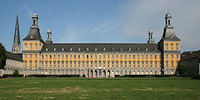- European ethnology is an empirical cultural science that examines and analyzes the cultural phenomena of European societies in past and present. The key term culture is a social system of action and order, which is not rigidly fixed, however, but must be understood as a form of social practice in which people continuously negotiate the rules they need for the organization of their everyday life and need to live together.
- The course imparts fundamental specialist knowledge, methods and working techniques of European ethnology. This knowledge is used to understand the historical foundations and the cultural components that characterize contemporary European societies. In particular, the students should be enabled to analyze cultural, gender-specific, ethnic and religious phenomena and conflicts and to interpret them in the context of historical, social and political developments.
- The module structure and the course content focus particularly on everyday cultural phenomena and combine historical, contemporary, comparative and reflective perspectives.
Bachelor of Arts [B.A] (Empirical Cultural Studies and European Ethnology)
3 years
On Campus
German
Field of Study:
€287/Yr
€287 /Yr
Important Dates
| Event | End Date |
| April | Jan 15, 2023 |
| April | Jul 15, 2023 |
Eligibility & Entry Requirement
Following are the requirements for this program:
- Statement of Purpose.
- Letter of Recommendation.
- Resume.
Scholarship Grants & Financial Aids
| Name | Amount | International Students Eligible | Application Deadline |
| Friedrich Ebert Foundation Scholarship | Variable | Yes | May 31, 2023 |
| British Council IELTS Award 2023 | €13047 | Yes | N/A |
| Deutschland Stipendium Program | €4363 | Yes | N/A |
| VueVille Future Technology Scholarship | €1000 | Yes | N/A |
Ask your question
Similar Colleges You Might Be Interested In
- Similar Colleges
No Ratings Found!!
Follow
No Ratings Found!!
Follow
No Ratings Found!!
Follow
No Ratings Found!!
Follow
No Ratings Found!!
Follow
No Ratings Found!!
Follow











.png?tr=h-40,w-40,c-force)
